#optimize url
Explore tagged Tumblr posts
Text
How To Optimize URL For SEO
0 notes
Text

nomming it
#this is more clearly fatfur-inclined than my usual art but this blog is 18+ so who fucking cares#my art#luna post#luna possum#that said i gotta get some NORMAL FUCKING ART on here#and maybe change my url to help my search engine optimization heal somewhat
537 notes
·
View notes
Text
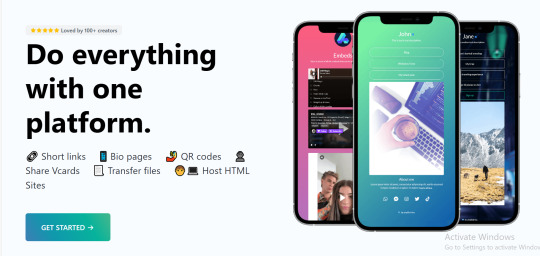
URL Shortener and qr code generator free online visit now on : http://html5joy.com/
#shortening#url shortener#qr code#seo services#seo#marketing#digital marketing#search engine optimization
3 notes
·
View notes
Text
3 notes
·
View notes
Text
#seo#search engine optimization#seo tools#search console#backlinks#anchor text#HTML#digital marketing#URL#website#website maker#seo optimization#seo optimizer#content marketing#seo marketing#keyword
5 notes
·
View notes
Text
How URL Shorteners Can Help Your SEO Efforts
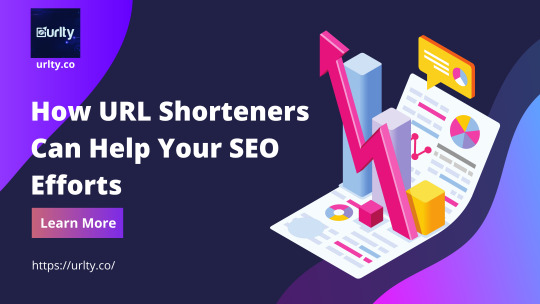
To increase organic traffic to your website and improve search engine rankings as an online business or website owner, you must improve your Search Engine Optimization (SEO) activities. Although there are many strategies to boost your SEO, one tactic that is sometimes disregarded is the use of URL shorteners. This blog post will discuss the benefits of using URL shorteners for SEO purposes as well as some best practices.
What are URL shorteners?
URL shorteners are tools that convert long and complex URLs into shorter and more manageable links. These shorter links can be used for sharing on social media, email marketing, or any other online platform. URL shorteners are typically used to save space and make links more aesthetically pleasing.
How URL Shorteners Help Your SEO Efforts
Better User Experience
URL shorteners can improve user experience on your website by making it easier for users to remember and share your links. Shorter links are also easier to read and more likely to be clicked on. This increased engagement can lead to more traffic and better search engine rankings.
Easier Sharing
With shorter links, it becomes easier to share links on social media platforms that have character limitations, like Twitter. A shorter link also looks more professional and less spammy, which increases the chances of people clicking on the link.
Improved Click-Through Rate (CTR)
URL shorteners can also help improve your click-through rate (CTR) in search engine results pages (SERPs). A shorter link is more eye-catching and easier to read, which can entice more clicks from users. This increased CTR can lead to better search engine rankings as search engines like Google consider CTR as a ranking factor.
Tracking and Analytics
Many URL shorteners come with tracking and analytics features that can help you track the number of clicks on your links. This information can be used to measure the success of your marketing campaigns and improve your overall SEO strategy.
youtube
Custom Branded Short URLs
Using a custom-branded short URL can also improve your SEO efforts. By using a branded short URL, you increase brand recognition and help with link attribution. This can lead to more traffic and better search engine rankings.
Best Practices for Using URL Shorteners
Use a reputable and reliable URL shortener. Some URL shorteners may be seen as spammy or harmful by search engines, which can negatively impact your SEO efforts.
Use a custom-branded short URL whenever possible. This not only looks more professional, but it also increases brand recognition and helps with link attribution.
Avoid using too many shortened links on your website. This can make your website look spammy and untrustworthy.
Always include a descriptive keyword in your URL. This helps search engines understand the content of your page and can improve your search engine rankings.
Example :
"https://www.amazon.com/Stealth-Multiplatform-Wireless-Noise-Cancelling-Xbox-X/dp/B0BX77C1LD/ref=sxin_16_sbv_search_btf?content-id=amzn1.sym.b000e0a0-9e93-480f-bf78-a83c8136dfcb%3Aamzn1.sym.b000e0a0-9e93-480f-bf78-a83c8136dfcb&cv_ct_cx=gaming+headsets&keywords=gaming+headsets&pd_rd_i=B0BX77C1LD&pd_rd_r=a9a3cb29-8ee0-4768-bd8d-eb8b5c60f294&pd_rd_w=S5Jxv&pd_rd_wg=2g8Mz&pf_rd_p=b000e0a0-9e93-480f-bf78-a83c8136dfcb&pf_rd_r=N0ZXSKASA5C2V185Q70B&qid=1683364941&sbo=RZvfv%2F%2FHxDF%2BO5021pAnSA%3D%3D&sr=1-1-5190daf0-67e3-427c-bea6-c72c1df98776"
this is a very large link and if you want to share with someone via social media, email it's not going to look nice but if you shorten this link using urlty.co you will get this : https://urlty.co/SdVq
2. "https://twitter.com/Cobratate/status/1615412288617385986?s=20" same with this link after shortening it : https://urlty.co/ajES
Finally, URL shorteners might be a useful tool for enhancing your SEO campaigns. URL shorteners can help you increase organic traffic to your website and raise your search engine rankings by enhancing user experience, raising click-through rates, offering tracking and analytics, and employing custom-branded short URLs. In order to prevent any detrimental effects on your SEO, just make sure to adhere to best practices and utilize a credible and trustworthy URL shortener.
3 notes
·
View notes
Text
URL Slug: Simple Steps to Boost Your SEO and User Experience

Ever wanted to know why some URLs look clean and simple while others are long, complicated, and confusing? That clean part at the end of a URL, known as an “URL slug,” plays an integral role in how easily people and search engines understand a page’s purpose. In SEO, it does much more than just look pretty — it enhances search engine visibility and user experience. What makes a slug so crucial to SEO, and how can I create slugs that will attract both visitors and search engines?.
What is a URL Slug?
A slug in a URL is what one finds after the domain name. It summarizes the content of a webpage in a few words. Such as in “www.example.com/seo-tips,” “seo-tips” is the slug. It should be descriptive, concise, and perhaps contain relevant keywords. A good slug is what gives both search engines and readers a bright idea about what they will find on the page; thus, it should be one of your website’s necessary structures.
Why do URL slug matter in SEO?
Relevance for Search Engines
Keywords in the URL slug are very important because they help the search engine understand the content of that page. Incorporating keywords informs search engines that your page aligns with current searches, thereby maintaining your page’s prominence in search results.
User Experience
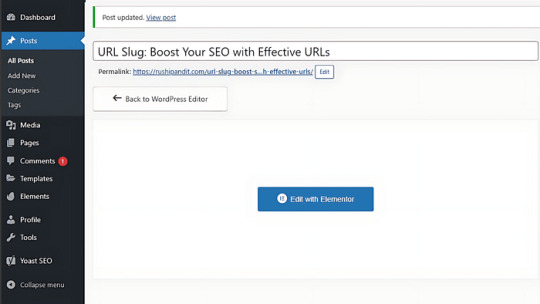
Link Sharing
It means that the web page with a simple URL — clean — will be shared more. Whether you are sharing via social media, email, or in a chat, a well-structured URL looks more trustworthy, which means it will be shared more.
Keyword Optimization
On-page SEO is improved by having your target keyword in the URL slug. The alignment of the URL with the page’s title and content creates an internal coherence for a search engine and helps the page in relevance representation.
Best Practices for Creating SEO-Friendly URL Slugs
It’s much more than the use of keywords — it’s a ‘court of clarity’ and simplicity in relevance to the message being communicated.
Short and descriptive: Avoid extra words. Ideally, aim for slugs that are simple, clear, and focused on a single topic.
Use Keywords: The primary keyword should creep into the slug as naturally as possible. Keyword-stuffing in slugs looks spammy and is not going to do your SEO any good.
Special Characters: Avoid and or?. These characters confuse the browser, and your URL may be unreadable. You don’t need anything but letters, numbers, and hyphens.
Hyphens instead of Underscore: For search engines, a hyphen is a space, so the URL will be more readable. “how-to-bake-cookies” is better than “how_to_bake_cookies.”
Use lowercase letters: Even if your URLs are case sensitive, do use lowercase. This avoids confusion and eliminates duplicate URLs.
Remove Stop Words: Words like “a,” “the,” and “of” are used in most slugs, but in most cases, they are not necessary, making the URLs longer than necessary. Keep it clean and to the point.
Common Mistakes to Avoid
Avoid these common mistakes for user-friendly, SEO-friendly slugs.
Long or complex slugs: The longer the slug is, the harder it is to read. More importantly, however, very long slugs dilute the meaning of the slug itself. Simplicity End.
Keyword stuffing: Loading a slug with keywords can give it a spammy look and may also hurt your SEO. Use one key word.
Urls Changing Very Frequently: It may result in a lot of broken links that will again deplete a lot of traffic and further harm SEO. Try to set the best possible slug and stick to it from day one.
How to Optimise Existing URL Slugs
If you’re optimizing existing slugs on your site, you can do this through the following step-by-step process:
When Optimizing Existing Slugs: If you change the slug of a URL, you would want to set up a 301 redirect to send the old one to the new one and keep it that way, so the SEO value is retained there and users aren’t taken to the broken page.
Track performance: Immediately after doing these changes, track them by using Google Analytics and Google Search Console regarding the traffic and rankings. It will show you whether those changes actually did happen or not.
Real-Life Examples of Good and Bad URL Slugs
Here are some examples to illustrate what works and what doesn’t in URL slugs:
Good: “www.example.com/digital-marketing-tips” is clear, contains relevant keywords, and the user knows at once what is going to be inside the page.
Bad: “www.example.com/p = 123abc456” — non-descriptive, with no keyword description, and does not create a response to either the user or a search engine.
For example, one is short and very easy to read, and the second is vague and not even memorable.
Conclusion
URL slugs are a small but powerful part of your SEO strategy. By keeping them clear, concise, and relevant, you improve both search engine rankings and user experience. Take a look at your website’s URL slugs and see if they’re up to par. By following the tips in this guide, you can create optimized slugs that contribute to your overall SEO success. Ready to improve your SEO? Start refining your URLs today!
For more information, Visit now
1 note
·
View note
Text
Google Search Console क्या है | Google Search Console in Hindi
आज के डिजिटल युग में, ऑनलाइन उपस्थिति किसी भी व्यवसाय या वेबसाइट के लिए अत्यंत महत्वपूर्ण है। अपनी वेबसाइट की स्थिति को ट्रैक करने और उसकी खोज इंजन रैंकिंग को बेहतर बनाने के लिए, वेबमास्टरों के पास एक महत्वपूर्ण उपकरण है: Google Search Console। ��ह एक ऐसा मुफ्त टूल है जो आपकी वेबसाइट के प्रदर्शन की निगरानी करने में मदद करता है और आपको SEO (Search Engine Optimization) की रणनीतियों को अनुकूलित करने…
#backlink analysis#Google Search Console#Google search results#Google webmaster tools#improve ranking#indexing status#keyword performance#mobile usability#organic traffic#search analytics#search appearance#search console guide#search console tutorial#Search Engine Optimization#SEO performance#SEO tools#site errors#site indexing#site visibility#submit sitemap#technical SEO#URL inspection tool#website monitoring#website optimization#website performance
1 note
·
View note
Text
youtube
Custom Website Development | Roadmap to Optimize ROI
No roadmap? No plan?
Your website deserves better. Let's create a plan and achieve success together.
🔗 Catch us at: 👉🏻 https://www.instagram.com/wseinfratech.team/ 👉🏻 https://www.facebook.com/wseinfratech.team 👉🏻 https://www.linkedin.com/company/wseinfratech/
➡️ Visit us at: https://wseinfratech.com/
Contact Us at: 🤙🏻 +91-907375 4444 📧 [email protected] 📧 [email protected]
#website development#web designing#custom web development#personalized website design#web development company#affordable website development#business solution#business website#website developer#website development company#website development agency#build your website#SEO optimized website developemnt#want to build a website#website is not just a url#customized web development agency#Tailored Solutions for Your Business Needs#ROI based web service#strategy#Youtube
0 notes
Text
Top Tips to Optimize Your URLs For SEO
Ever thought that URL structure matters a lot?
Yes, it does. It is very important to optimize URL structure for better performance in search engines and traffic. As an Top SEO agency, we understand the significance of this. There will be some questions in your mind related to this topic, and I am going to explain them to you in this article.
Whenever you search for anything on Google, you will only get a clean and easy-to-understand URL at the top of Google. For instance, here are the results I got when I searched for content marketing on Google.
You can see these are very simple and short. Even anyone can remember them very quickly. The reason behind their ranking is their URL structures. I am not saying that anyone can’t rank for any keyword without having a good URL structure, but it is taken into consideration when ranking any website on Google.
How to optimize your URLs?
1. Keep your URL clean

By this heading, I want to tell you to keep your URL structure as easy as possible. As we saw in the image above, URL structures are very simple, and people can remember them very quickly.
If your URL can’t be remembered by people, you are going wrong. You should improve it. You can do that by following these tips while setting up the URL structure of your articles or your site. You will never like to Use Dynamic URL structures. They will not give users a good experience.
Dynamic URLs are the URLs that contain symbols like “#,” “?”,”+,” =,” and more within it. They are used to navigate throughout the page if the page is more extensive. In WordPress, If you do not set up a URL structure, It will assign the default URL structure of WordPress, which is Dynamic.
Here is an example of dynamic URLs that are not user-friendly or human-friendly.
As you can see, these URLs are not human-friendly, and if the person isn’t techy, he/she can’t remember them. Instead, Check the URL structures below,
In comparison with dynamic URLs, static URLs are very easy to remember and are human-friendly. Yes, In some cases, you need Dynamic URLs, and they also get indexed in Google, but they are not good when it comes to User Experience.
2. Using keywords in the URL

You would like to use keywords in your URLs because they will help you get better search engine rankings. Whether it is a Dynamic URL or a simple URL, you can get a better rank in search engines by using keywords.
It is always good to put keywords in URLs. For example, if the main keyword has Backlinks for the personal blog, then your URL can be http://www.yoursite.com/backlinks-for-personal-blog to make it look better and easy to remember. Moreover, you will rank higher in search engines because you have an exact match keyword in the URL.
I’ve many articles on my blog ranking in the same way. One more thing you need to care about is delimiters. It is always recommended to use “-” as a delimiter to separate keywords in an article. If there is no delimiter between keywords in the URL, then it is very hard to read and remember. Here is an example:
http://www.domain.com/backlinksforlongtermblog – Hard to read and remember.
http://wwww.domain.com/backlinks-for-long-term-blog – Very easy to read and remember.
So, now you know that simple URLs and keywords rock the rankings. There is much more to know about URL structures; let us continue the most important part.
3. Length of URL
If your URLs are very long, then you have to take care of the length of them. This is because Google doesn’t display whole URLs in SERPs; you need to shorten your URLs to make the URL show as a whole URL in SERPs.
So, the optimal length for the URL to get better results is 40-60 characters, including your domain. So, trim up your extra characters and Slugs from your URLs and make them as short as possible. Use keywords to make it more SEO-friendly.
Here is an example of the Perfect URL.
Home page –> http://www.domain.com
Article page –> http://www.domain.com/article-keywords
Category and tag pages –> http://www.domain.com/category-or-tag
Similarly, you can put static and simple User-friendly URL structures for every page on your blog or site to get better results.
Nowadays, Google wants to give users a perfect page in which they can solve their questions without messing up anything. So, Google will only show simple and trustworthy pages to users. If your URL structure is better, you will rank higher.
Wrapping it up:
URL structures matter a lot when it comes to user experience and search engine performance. If users remember it, there is a higher chance that they will come to your site again to gain more knowledge from your blog or site.
Search engines consider URL structure, and there are some cases in which any site ranks in the #1 spot without having the same keyword in the whole content but only once in the URL. So, We can’t underestimate URL structure.
If many URLs provide the same content, then you can use a Canonical tag to avoid plagiarism. So, these are some rules you need to know when it comes to optimizing URL structure.
1 note
·
View note
Text
Optimize Your Website Speed using 10 Best Practices & Tools
Website speed optimization is a very challenging task. Attaining the ideal website speed is every business’s desire. According to Google, a user expects that the web page should load within 3 seconds. To achieve the expectation, we as SEO professionals should make sure that a thorough analysis is performed to identify key action points; otherwise, chances are there that we might lose organic traffic and revenue.
Techniques mentioned in this article on how to optimize website speed will help you achieve desired page speed, but we need to take into consideration the turnaround time required for the website developer to implement the recommendations.
We must also analyze the reports generated by using website speed optimization tools and identify key impactful metrics affecting the website load time. Focusing on these impactful factors and trying to resolve them should be our priority.
According to the reports published by WPO Stats, by implementing the above-mentioned website speed optimization techniques if the site speed improves by even a second, then the efforts are worth it.
0 notes
Text
Unleash the Power of On-Page SEO to give Your Website to New Heights.
In today's fast-moving digital world, having a great website is more than just looking good or working well. There are so many websites out there, all trying to get noticed. That's where Search Engine Optimization (SEO) comes in, and one of the most important parts of SEO is on-page optimization. It's all about making sure your individual web pages are set up in the best way possible to attract attention from search engines.
On-page SEO means making your website pages better so they show up higher in search engine results and get more visitors. It's stuff you do on your own website, like using the right words and making your pages easy to read. Off-page stuff, like other websites linking to yours, is also important, but on-page SEO is something you can directly work on yourself to help your site do well in search engines.
Here’s a comprehensive guide to mastering on-page SEO and unlocking the full potential of your website:
Keyword Research: Your website will be better when you conduct keyword and phrase research related to your business brand. To find these, you can use tools like Google Keyword Planner, SEMrush, or Ahrefs, etc.That help your website to highly rank on Google first page.
Content Optimization: Good content is really important for SEO. Make sure your content is good quality, useful, and interesting for your readers. Use your main words naturally in your titles, headings, and throughout your writing.
Title Tags and Meta Descriptions: Create easy-to-remember titles and descriptions for your web pages to increase clicks and attract more visitors. These titles and descriptions also inform search engines about your business, helping you attract more customers. Keep them short, clear, and include important keywords.
URL Structure: A clean and easy-to-use URL structure makes it better for people using your site and helps search engines understand the content of your pages. Keep important words in your web addresses and avoid using long, confusing combinations of letters and numbers.
Headers and Subheadings: Proper use of headers (H1, H2, H3, etc.) helps to improves readability and helps search engines understand the structure and hierarchy of your content. Incorporate your target keywords naturally into your headers and subheadings.
Image Optimization: Using good images can make your website look better, but they also affect how well you show up in search engines. Optimize your images by using descriptive file names and alt text that includes relevant keywords to describe the images well.
Internal Linking: Linking to other pages within your website helps spread the importance of those pages and encourages visitors to check out more of your stuff. Put links to other pages that make sense in your writing to help people find their way around better and make your website more search engine friendly.
Mobile Optimization: Since most people use phones to go online, it's super important that your website works well on mobile. This means it should adjust to fit different screen sizes and load quickly. It's not just about making it easier for users, but also for search engines to find and rank your site.
Page Speed Optimization: Page speed is a important for ranking factor in search engine algorithms. Minimize loading times by optimizing images, leveraging browser caching, and reducing unnecessary scripts and plugins.
Schema Markup: Schema markup provides search engines with additional context about your content, helping improve visibility in search results. Implement schema markup where applicable to enhance rich snippets and increase click-through rates.
In conclusion, It's really important to do on-page SEO well to make sure your website is seen and works well online. By following the earlier tips and staying updated on new developments in SEO, you can make sure your website does well and gets lots of visitors from search engines. Just remember, SEO is something you always need to keep working on to stay ahead.
#google ranking#keywords research#on page SEO#SEO strategy#content optimization#digital marketing#URL structure optimization#SEO services#meta tag optimization#website traffic#online visibility
0 notes
Text
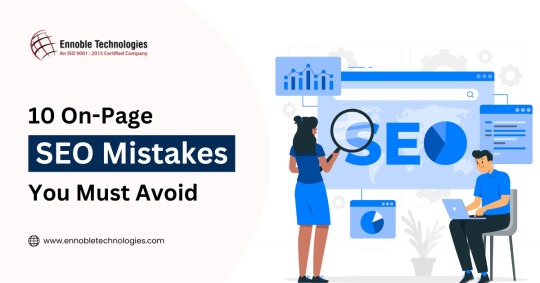
Avoid 10 on-page SEO mistakes for optimal website performance. Enhance your SEO strategy and improve search engine rankings. Explore our insights now!
Understanding Crucial On-Page SEO Mistakes
As digital landscapes evolve, mastering on-page SEO practices becomes pivotal. Amidst the quest for visibility and higher rankings, steering clear of certain blunders is paramount. Let’s delve into ten critical on-page SEO mistakes that can significantly impact your website’s performance and discover effective strategies to sidestep these pitfalls.
1. Neglecting Title Tags: The Gateway to Visibility
Title Tags: Your virtual welcome mat to users and search engines alike. Overlooking their significance undermines visibility. Ensure title tags encapsulate relevant keywords, succinctly describe content, and entice clicks.
2. Subpar Content Quality: The Foundation of Engagement
Content Quality: The cornerstone of user engagement and SEO success. Lackluster, uninformative, or duplicated content repels users and downgrades your site’s ranking potential. Focus on original, valuable, and keyword-rich content to captivate audiences and appease search algorithms.
3. Ignoring Meta Descriptions: A Missed Opportunity
Meta Descriptions: Often underestimated, these snippets play a vital role in attracting clicks. Crafting compelling, concise meta descriptions infused with keywords and a clear call-to-action can significantly enhance click-through rates.
4. Unoptimized URL Structures: Navigational Clarity Matters
URL Structures: An often overlooked but pivotal aspect of on-page SEO. Clean, descriptive, and keyword-rich URLs aid both search engines and users in understanding your content. Avoid lengthy, convoluted URLs that hinder navigation and comprehension.
5. Inadequate Internal Linking: Overlooking Pathways
Continue Reading : https://ennobletechnologies.com/seo/10-on-page-seo-mistakes-you-must-avoid/
#On-Page SEO Mistakes#Meta tags#Keyword stuffing#Slow page speed#Broken links#Poor URL structure#Missing alt attributes#Duplicate content#Ignoring mobile optimization#Incorrect header tags
1 note
·
View note
Text
#seo#search engine optimization#seo tools#search console#backlinks#anchor text#HTML#digital marketing#URL#website#website maker#seo optimization#seo optimizer#content marketing#seo marketing#keyword
5 notes
·
View notes
Text
Introduction
In our fast-paced world, time is a precious commodity. Whether you’re a student, professional, or entrepreneur, finding ways to streamline your daily tasks can significantly boost productivity. Enter ChatGPT, an AI language model that can assist you in automating various aspects of your work. In this article, we’ll explore nine ChatGPT prompts that can revolutionize the way you tackle your busy schedule.
1. Calendar Management
ChatGPT prompts: “Schedule a meeting for next Tuesday at 2 PM.”
ChatGPT can interact with your calendar application, whether it’s Google Calendar, Outlook, or any other platform. By providing clear instructions, you can effortlessly set up appointments, reminders, and events. Imagine the time saved when ChatGPT handles your scheduling!
2. Email Drafting
ChatGPT prompts: “Compose an email to my team about the upcoming project deadline.”
ChatGPT can draft professional emails, complete with subject lines, body text, and even attachments. Simply describe the purpose of the email, and let ChatGPT do the rest. It’s like having a virtual assistant dedicated to your inbox.
3. Code Generation
ChatGPT prompts: “Write a Python function that calculates Fibonacci numbers.”
Whether you’re a programmer or a student, ChatGPT can generate code snippets for various programming languages. From simple functions to complex algorithms, ChatGPT can save you hours of coding time.
4. Content Summarisation
ChatGPT prompts: “Summarise this 10-page research paper on climate change.”
Reading lengthy documents can be daunting. ChatGPT can analyse and condense large texts into concise summaries, allowing you to grasp essential information quickly.
5. Social Media Posts
ChatGPT prompts: “Create a tweet announcing our new product launch.”
Crafting engaging social media content is essential for businesses. ChatGPT can generate catchy posts for platforms like Twitter, LinkedIn, or Instagram, ensuring your message reaches your audience effectively.
6. Language Translation
ChatGPT prompts: “Translate this paragraph from English to Spanish.”
Whether you’re communicating with international clients or learning a new language, ChatGPT can provide accurate translations. Say goodbye to language barriers!
7. Data Analysis
ChatGPT prompts: “Analyse this sales dataset and identify trends.”
ChatGPT can process data, create visualisations, and extract insights. Whether it’s sales figures, customer behavior, or market trends, ChatGPT can help you make informed decisions.
8. Creative Writing
ChatGPT prompts: “Write a short story about time travel.”
Beyond practical tasks, ChatGPT can unleash creativity. From poems to fictional narratives, ChatGPT can be your muse when inspiration strikes.
9. Personalised Recommendations
ChatGPT prompts: “Suggest a book based on my interests in science fiction.”
ChatGPT can recommend books, movies, restaurants, or travel destinations tailored to your preferences. It’s like having a knowledgeable friend who knows your tastes.
Conclusion:
These nine ChatGPT prompts demonstrate its versatility. By integrating ChatGPT into your workflow, you can automate repetitive tasks, enhance communication, and free up valuable time. So, next time you’re swamped with work, turn to ChatGPT—it’s like having a digital assistant that works tirelessly to simplify your life.
In addition to ChatGPT, there are several other powerful AI tools designed to automate various tasks. Let’s explore some of them:
ACCELQ: A codeless AI-powered tool that seamlessly tests software across multiple channels (mobile, desktop, etc.). It offers continuous test automation and minimizes maintenance efforts1. You can find more information on their website.
Katalon: An AI tool for test automation that provides a complete solution for testing mobile applications and websites. It features a robust object repository, multi-language support, and efficient test results1. Check out Katalon’s website for details.
Selenium: An open-source AI tool for automating web and application testing. It’s commonly used for regression testing, functional testing, and performance testing1. You can explore more about Selenium on their official website.
Appium: Specifically designed for mobile app automation, Appium supports both Android and iOS platforms. It’s an excellent choice for mobile testing1.
Cypress: Known for its fast execution and real-time reloading, Cypress is an end-to-end testing framework for web applications. It provides a great developer experience1.
Parasoft: Offers comprehensive testing solutions, including static analysis, unit testing, and API testing. It’s widely used in the industry1.
Cucumber: A behavior-driven development (BDD) tool that allows collaboration between developers, testers, and non-technical stakeholders. It uses plain text specifications for test cases1.
TestNG: A testing framework inspired by JUnit and NUnit, TestNG supports parallel execution, data-driven testing, and test configuration flexibility1.
LambdaTest: A cloud-based cross-browser testing platform that allows you to test your web applications across various browsers and operating systems1.
Robot Framework: An open-source test automation framework that uses a keyword-driven approach. It’s highly extensible and supports both web and mobile testing1.
TestCraft: A codeless automation platform that integrates with popular tools like Selenium and Appium. It’s suitable for both manual and automated testing1.
Watir: A Ruby library for automating web browsers, Watir provides a simple and expressive syntax for testing web applications1.
Remember that each tool has its strengths and weaknesses, so choose the one that best fits your specific needs. Whether it’s testing, content creation, or workflow automation, these AI tools can significantly enhance your productivity and efficiency.
#generate-a-random-password#convert-a-pdf-to-a-text-file#create-a-qr-code-for-a-url#calculate-income-tax#convert-a-video-to-gif#extract-text-from-an-image#merge-multiple-pdf-files#generate-a-summary-of-a-long-text#find-duplicate-files-in-a-directory#ChatGPT prompts#Automate busy work#Blog writing workflow#Content creation#Keyword research#SEO optimization#Productivity hacks#Time-saving tools#Streamline workflow#9 ChatGPT Prompts to Automate Your Busy Work
0 notes
Text
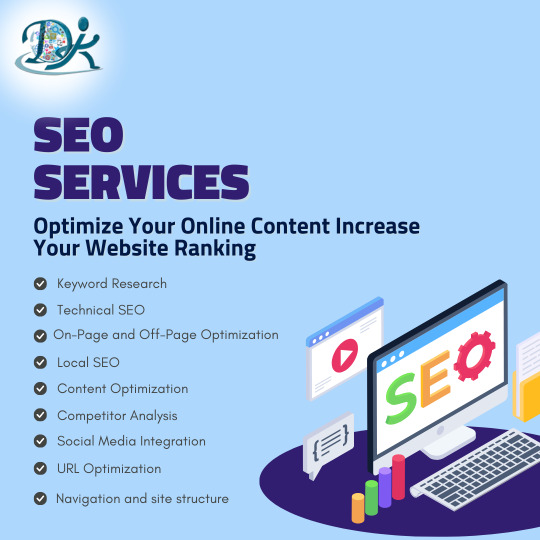
Boost website exposure and traffic with our all-inclusive SEO services. Careful keyword research, strategic on- and off-page optimization, advanced technical SEO, focused local SEO strategies and content optimization are some of the services we provide. With thorough analysis, learn more about your competitors and incorporate social media into your SEO plan with ease. Make sure that the navigation and URL structures are user-friendly. With our specialized SEO services, you may improve your online visibility and get higher search engine ranks.
#seo services#seo#on page seo#off page seo#keyword research#content optimization#ranking#url optimization
0 notes